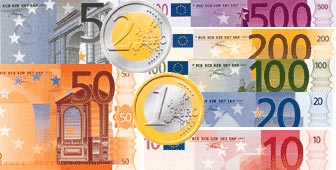Swiss fortunes tied to the euro

Although Switzerland is not part of the eurozone, the new currency has major implications for the Swiss economy.
The new European single currency was first introduced as a tradable unit on financial markets back in 1999.
However, it won’t be until January 1, 2002 that the euro actually becomes legal tender, with notes and coins replacing former national currencies in the 12 participating EU countries.
Stefan Hoffman, head of economic research at the Basel-based Swiss Bankers Association, told swissinfo that two sectors of the Swiss economy would most feel the impact of the introduction of euro cash.
“Most affected will be retailers, certainly those near the border such as here in Basel, where you have a lot of cross border traffic,” explained Hoffman. “And the second sector to be affected will be tourism, where there are also a lot of people coming and going with lots of cash as well as credit cards.”
Financial sector affected
There has already been some impact on the Swiss financial sector since the euro’s introduction in 1999, according to Hoffman.
“At the time when the euro was introduced as a tradable currency above all the financial sector was affected as all the securities had to be changed from French francs and German marks into euros, with new payment systems also being developed at that time.
“At the first stage it was purely the financial sector that was affected while the man on the street had little to do with the changes – then it was a virtual currency but all that will change from January 1 2002.”
Ties to eurozone
Most of Switzerland’s trade is done with the neighbouring EU states of Germany, France, Italy and Austria. All of these countries became part of the eurozone in 1999 and will be getting rid of their national currencies come January 1.
This has meant that the Swiss franc’s fortunes have been somewhat tied to that of the euro, as the economic strength of Switzerland’s neighbours directly influences the performance of the domestic economy.
Fears have mounted that the Swiss franc might even become no more than a satellite currency to the euro. However, Hoffman believes that despite the franc’s close links to the single European currency the Swiss unit still retains some independence.
“If you look at what has happened in the last few years the Swiss franc has been closer to the euro than the US dollar, but it has depreciated not quite as much as the euro did against the US unit,” said Hoffman.
“The Swiss franc is not quite a 100 per cent satellite of the euro but it’s also not a totally independent currency as well. We’re closely linked to the euro but we’re not one-to-one related to it.”
In fact, in the past three months the Swiss National Bank has cut interest rates, which directly affect the Swiss franc’s trading value, quite separately from the European Central Bank on a number of occasions.
Euro outlook improves
The euro has failed to live up to many analysts’ expectations since its launch on the markets in 1999. Hopes then were that the new single European currency could perhaps rival the US dollar as the world’s leading currency.
However, the euro has lost a lot of ground against the US unit, dropping beneath parity versus the dollar, as the US economy continued to be seen as the stronger.
But the terrorist attacks on the US on September 11 and the ongoing attacks on Afghanistan have seen something of a change of economic fortunes.
With the US economy looking less resilient with regard to recession the eurozone economies are beginning to appear more attractive, giving the euro some support.
“In 1999 everyone thought the euro would be a strong stable currency vis-à-vis the dollar against which it declined,” said Hoffman. “But we have reached the point now where growth is quite slow in the US and the most likely probability is that the euro will gain rather than lose out to the dollar over the next two to two and a half years.”
The introduction of euro cash might even provide some psychological shot-in-the-arm to the currencies’ fortunes.
ECB needs time
The European Central Bank (ECB) has come in for criticism over its management of the eurozone’s monetary affairs in the past three years.
At times its decision making process, which involves co-ordinating the economic and political requirements of the twelve eurozone member countries, has seemed cumbersome.
But Stefan Hoffman believes the ECB is a young institution and still needs time to settle into its role.
“If you look at the economic differences between say Portugal and Germany these are still quite large. They still have to come together and that takes some time, some practise as well as mutual understanding.”
by Tom O’Brien

In compliance with the JTI standards
More: SWI swissinfo.ch certified by the Journalism Trust Initiative
You can find an overview of ongoing debates with our journalists here . Please join us!
If you want to start a conversation about a topic raised in this article or want to report factual errors, email us at english@swissinfo.ch.